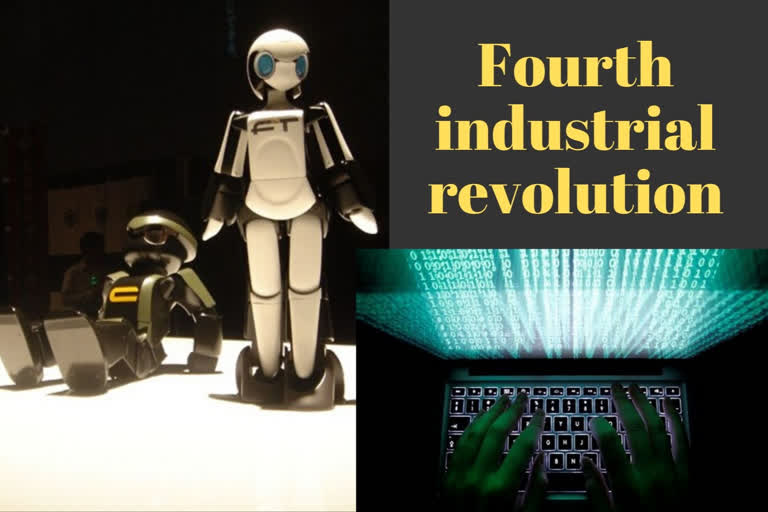Hyderabad (Telangana): The world has witnessed three industrial revolutions until now. The fourth industrial revolution is set to bring about sweeping economic and social changes.
As many as 26 lakh robots are working in industries worldwide. In the USA, 45 per cent of the jobs are going to get automated. In these times, where technological advancements are happening by the minute, there is a need to reform our education system.
After James Watt invented the steam engine in 1780, about three industrial revolutions took place in the world.
The fourth revolution is now happening. The latest technologies are rapidly transforming our lives and livelihoods. They are connecting humans with machines, besides connecting humans with fellow humans.
Given the fact that 26 lakh robots are employed worldwide, we can imagine the nature and disposition of the fourth industrial revolution.
Latest advancements like Artificial Intelligence(AI), Big Data, Internet of Things, 3D printing, Blockchain, Augmented Reality, Virtual Reality, Machine Learning are changing the face of the world.
Banks are already utilizing AI to estimate the credit eligibility of their customers. In order to sanction loans, Big Data Analytics is being used in the place of managers. In some organizations, robot lawyers have replaced human lawyers. Employee salary reports and the company’s balance sheets have been automated. With automation, companies’ productivity, efficiency and profitability will increase.
Also read: TN: AIADMK's general and executive council meeting begins
With the fourth industrial revolution, especially Big Data, it is estimated that the world Gross domestic product (GDP) will rise by 14 percent by 2030. PricewaterhouseCoopers (PwC) estimated that this rise is equivalent to USD 15.7 lakh crores.
In USA, 45 percent of the jobs are going to be lost due to automation. In nations like India, automation might take a while to create an impact as the wages are less and workforce availability is more.
McKinsey Global estimated that by 2030, 15 percent of the worldwide workforce will lose their jobs to automation. Though automation replaces many jobs, it also creates new jobs.
Nobody is able to visualise the nature of new jobs. They are assuming that 8-9 percent of the current workforce will be part of those new jobs.
In the future, freelance and part-time jobs will replace full-time employment. There will be an increased demand for people who door-deliver groceries, motor vehicle drivers and those who write ledger accounts.
There will be times when experts from various countries will work together on a single project. Gradually, the gap between organized and unorganized sectors is going to disappear. According to the Global Development Group, the current worldwide workforce is 350 crores. As of now, only 3 percent of them are working as freelancers. Slowly, with the rising importance for creativity and innovation, robots will take over low skilled jobs. Along with Intelligence Quotient (IQ), Emotional Quotient (EQ) is important to pace forward in the jobs of the future.
In the place of rote memorisation, those who possess analytical and logical skills, critical thinking, problem-solving and decision-making abilities are going to be successful. The OECD report revealed that those with creative, technical and management skills will thrive in the jobs and businesses of the future.
Once upon a time, it took decades and centuries for a technological invention while it is only a matter of months now. In order to get on with the jobs, it is imperative to develop new skills from time to time.
By the time a student graduates in engineering, the old jobs would have been replaced by new ones. That is why it is mandatory to learn new skills along with those learnt in the college. The young generation must learn new skills every now and then.
But our education system is lagging behind with age-old curriculum. Our method of instruction is happening in such a way that the teacher teaches and the student listens.
In class, some students will be intelligent than others. Some students will be less intelligent than others. Some learn fast while some are slow learners. But the education methods are not designed as per the students’ standards.
Every student is supposed to take the same exam. Marks are awarded to those who by-heart than to those who understand the concept. The current method of instruction, which was designed during the first industrial revolution to create clerks and factory workers; does not work in the times of the fourth industrial revolution.
The teachers and students must run alike to put up with the pace of technological advancements. The system of a college education will slowly disappear. Studying the lessons beforehand, group discussions with batch mates, achieving a solution through teamwork, online education and multidimensional teaching-learning are going to be a norm.
By acquiring skills from various platforms, a student will become both a teacher and a pupil. Teachers will be there to mentor them.
Artificial Intelligence, Virtual Reality and Augmented reality will change the dynamics of teaching-learning. Instruction methods like McGraw Hill Smart Books, which assess the interests of students are now available.
The fourth industrial revolution education will focus on creating students who think towards achieving a solution instead of merely aiming for jobs. It will mould leaders who are stable in most unstable and changing conditions.
Higher learning centers will implement education methods based on the student’s capabilities and interests. Educational institutions must align with the industry and society and provide suitable internships to their students.
Students must be encouraged to do projects. Career advice and guidance must be given at times. Students must be given a chance to work while they learn.
There must be a provision to re-enrol students who are already employed. Learning the right courses and getting employed, going back to learn other courses in case necessity arises must become the norm. That is the essence of the fourth industrial revolution.
Also read: We can prove majority in 10 minutes flat: Sanjay Raut


